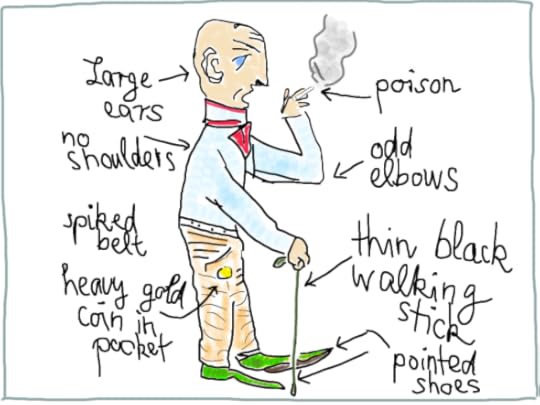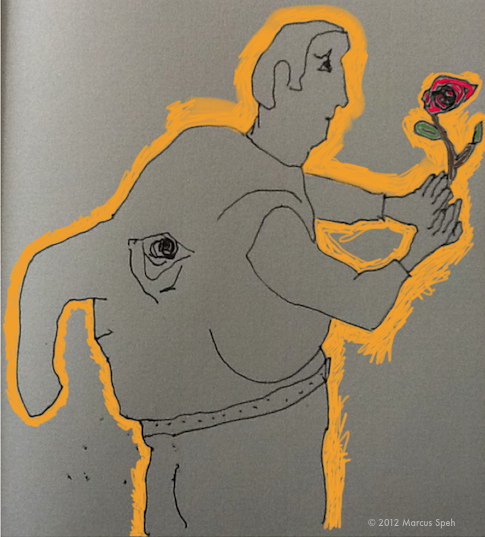Marcus Speh's Blog, page 5
September 27, 2012
feet-grabbing angels
I am sick of my routines. One of the routines I’m sick of is that I get routinely sick of my routines. Tomorrow I’m going to go into work. Several people are going to look at me and I wonder whoever it is they see: I’ve got a preference, I’d like them to see a writer, but if one of the writers I know would ask me if I saw him as a writer, I wouldn’t know what to say except that I might nod in order to please him, or to avoid hurting him. So, who are they going to see when they look at me? Does it matter? Can I change what they see? I’ve always thought that everyone has the power to make other people see. See you as who you really are. But I’m not so sure right now. Not sure at all. This power over others is a rather crude proxy, like comparing your pair of eyes to a pair of spectacles. You don’t see with spectacles per se. In fact, you see less with spectacles. You might be better off not having any. I’m thinking of my 98-year-old aunt, who’s almost completely blind, but really, now she only sees what she wants to see. When someone asks, do you know who I am? She thinks, do I want to see this person? And then, with the perfect innocence of the ancients, she makes her decision. But the other one will never know what goes on behind her eyes: they are silvery and flat like the dried out bed of a desert lake. When I look at my aunt, who usually decides to recognize me, I think that angels grab your feet when you die, so that you don’t just fly off in all directions at once.
[image error]
Edward S. Curtis, Old Blood (Wikimedia)

old blind blonde
I am sick of my routines. One of the routines I’m sick of is that I get routinely sick of my routines. Tomorrow I’m going to go into work. Several people are going to look at me and I wonder whoever it is they see: I’ve got a preference, I’d like them to see a writer, but if one of the writers I know would ask me if I saw him as a writer, I wouldn’t know what to say except that I might nod in order to please him, or to avoid hurting him. So, who are they going to see when they look at me? Does it matter? Can I change what they see? I’ve always thought that everyone has the power to make other people see. See you as who you really are. But I’m not so sure right now. Not sure at all. This power over others is a rather crude proxy, like comparing your pair of eyes to a pair of spectacles. You don’t see with spectacles per se. In fact, you see less with spectacles. You might be better off not having any. I’m thinking of my 98-year-old aunt, who’s almost completely blind, but really, now she only sees what she wants to see. When someone asks, do you know who I am? She thinks, do I want to see this person? And then, with the perfect innocence of the ancients, she makes her decision. But the other one will never know what goes on behind her eyes: they are silvery and flat like the dried out bed of a desert lake. When I look at my aunt, who usually decides to recognize me, I think that angels grab your feet when you die, so that you don’t just fly off in all directions at once.
[image error]
Edward S. Curtis, Old Blood (Wikimedia)

September 22, 2012
hipsters having sex
Speh: «An egg-headed, shoulderless man, a creature from a Beckett novel perhaps, who had a heavy gold coin in his right pocket, a belt spiked with pieces of bone and pointy brown shoes, walked slowly into another story, leaning on a thin black cane. He wore an awkward smile, but what’s that supposed to mean anyway—there are people whose expressions are simply awkward. The man’s face was of the kind that made anything moving in it seem slightly off balance, causing askance looks of almost anyone passing him. And many did, because he would proceed as slowly as a cloud blown across a windstill sky muttering something to himself that his lips did not want to say, puffing smoke to clear the way ahead of him, picking up stones and slinging them across the pavement. To be perfectly honest, I don’t think this man ever reached his destination.»
Man: what are you talking about? Of course I can get into any story I choose to. Check out all my props! Isn’t this what being a successful character is all about, props?
Speh: no, I’m sorry, props mean nothing. What a good character needs is potential for development. You rather remind me of one of Dickens’ characters, too set in your ways already. I bet every other reader, after this description, believes he has a sure idea where you might be going with all these props and pomp.
Man: (in a conciliatory tone) well, dear master, if I may address you thus, I must thank you for comparing me with a Dickensian type. But I must also disagree: isn’t the lyrical reaction that my passing through a crowd evokes a clear sign of that “potential”? If I were the reader, I’d be looking for a story now.
Speh: I keep having these conversations with my own creatures. I’m not sure I want to. You can’t really be trusted to give me good advice, you’re not impartial, you wish to live and succeed on the stage. What if characters are like actors in real life, what if they don’t want to be relegated to B-actor status?
Man: you can trust me, Marcus. Or rather, you must trust me, who else can tell you what I’m good for if not I?
Speh: You have a point there.
Man: I even got a hell of an idea for you. You’ll be ecstatic! It’s da bomb!
Speh: I wouldn’t use any of these expressions.
Man: I’m not you. And perhaps it’s a word you should get better acquainted with, because I’m all about ecstasy and action.
Speh: touché. [You can always get the writer by pointing out how much he still has to learn.] Though I’m also not good at action.
Man: you see! What if you’d put me in the graphic novel, you know, a comic. This is something you could easily do on the side, for fun, during the summer. I know that you like to draw…
Speh: (in a noncommittal tone) I’ll think about it.
Man: … I even have a title for you!
Speh: (less than excited) let’s hear it.
Man: “Hipsters Having Sex”. What you think, is that great or what?
Speh: sure. Sounds like a winner. Like “Elephants Learning To Fly”. Really, I’m not an expert on hipsters (Speh points out his bald head, his clean-shaven face, his inconspicuous habits, his family values, his preference for dead Russian writers, for deep, informed existential debate etc.), but from what I can discern, isn’t sex, dirty, sweaty, regular sex the activity farthest from their minds? (He’s off to write.)
Are hipsters having sex?

September 16, 2012
What does it mean to be published now?
“Hi honey, I’m going to be e-published!”
I can’t believe that I’m publishing yet another post on publishing. But when David Ackley asked the question last week on Fictionaut, so many interesting, passionate, even lyrical responses poured forth that I couldn’t help it when I stumbled on the discussion today. It also felt relevant because I have lately engaged plenty with the alt lit crowd, who are positioned as anti-establishment and highly digitally enabled (not the only ones, of course) and who discuss a similar topic this weekend on Facebook.While I’m affected (and saddened) by some of the experiences shared here, I don’t agree with the negative views on the demise (?) of either publishing or bookshops.
I just spend a couple of hours in an English bookstore 5 min. from our doorstep in Berlin. It’s a Sunday. In Germany this means everything is closed, or is supposed to be and I presume the bookstore gets to be open because they also sell coffee and muffins. The store was stuffed with people sitting in the comfortable chairs using it evidently as a place to meet, read and relax in the midst of books. This is not an established bookstore: it’s run by a Czech couple and was opened only a year ago. In our neighborhood, which used to be bohemian and has become affluent over the past 10 years, 3 bookstores have opened in the last 2 years alone. Small bookstores, sometimes specialized, but no chains, run by exactly the type of person that Darryl Price describes.
Berlin street scenes: jolly and weird.
Now, this is Berlin, it’s a special place with a great influx of artists and young people from all over the world. It’s a trendy neighborhood within Berlin. But when I go to other parts of the city, the picture is similar. At the same time, the big book selling chains that supposedly choked all the small stores, are full, too. These are just observations but what else do we have it in the other day, especially with regard to contentious issues that no 2 people can agree upon?“I lost an eye fighting publishing harpies!”
I could go on in a similar vein on the topic of publishing. Take a look at Gissing’s “Grub Street” for a taste of the ancient, traditional vampirism of publishers and the literary world—I found the description heart-wrenching when I recently read it more than 100 years later. To follow up on David’s story about Walt Whitman: who published Proust’s masterpiece? (Answer: the first volume, Swann’s Way, was vanity publishing, paid for by the author himself). Or take Joyce’s experiences with publishing “Dubliners” (not an example of experimental prose):“Between 1905, when Joyce first sent a manuscript to a publisher, and 1914, when the book was finally published, Joyce submitted the book 18 times to a total of 15 publishers. The book’s publishing history is a harrowing tale of persistence in the face of frustration.” (Via Wikipedia)
At the same time most of the books that I see published in the literary fiction market are, while consistently technically better written than books for the mass market, of low quality. They are not good books to my mind: they do not lend wings to my imagination. The books in the market on average (the very few exceptions confirm my inference) do not cement my pride in the print-based publication industry. They make me hungry for change, which is coming as sure as eggs is eggs.
“Alt Lit knows how to party”
I spend a fair amount of time listening to, talking with and blogging for younger writers (even though many of them are less “beginning” then I am myself), who embrace the new e-publishing paradigm rather naturally – like the alt lit writers, perhaps with a tad more conceit for the old ways than necessary, but entirely not without respect either. Doing that has sharpened my understanding for things to come.The replacement of one paradigm by another, of one world by another, never is a pleasant process. It isn’t pleasant for people on either side: those who are left behind feel left out and dismissed; and those who build the new world share all the discomforts, uncertainties and fears of the pioneer. One should think that Americans understand this more than any other people. Hence I am somewhat surprised at the (overall) negative tone of the discussion—facilitated in a medium and on a platform — Fictionaut — that did not exist 5 years ago.
Dressed to kill? I’m meeting an agent.
I say all this while looking forward to another meeting with a literary agent next week. An agent of the aging publishing industry of printed books, I hasten to add. It’ll be the jolly meeting of two dinosaurs and I hope to meet someone I can drink with to the new age, to better books and more power for poets!I can’t really say what “publication” means, but I do know that it’s changing fast, and not to the worse, just to something more acclimated to the current weather. I also don’t know where the balance lies between, say, digital and nondigital publishing for a writer, but I doubt that it was ever easy for a writer to straddle the fences that crisscross the reality of writing or to find the right way to talk to everyone who has staked a claim in the land of story-making.
“Fear mingles with pleasure”
In more than one respect, digital literature in digital publishing is alien to established readers and writers. This alienness may breed repulsion and it may breed respect. I’m reminded of what Virginia Woolf said beautifully, mysteriously about “The Russian Point of View”:“… the mind takes its bias from the place of its birth, and no doubt, when it strikes upon a literature so alien as the Russian, flies off at a tangent far from the truth.”
Perhaps the mind is not the best companion when it comes to appreciating current changes in publishing. Mine certainly “flies off at a tangent far from the truth.”
Just write.

September 14, 2012
Recycling Facebook
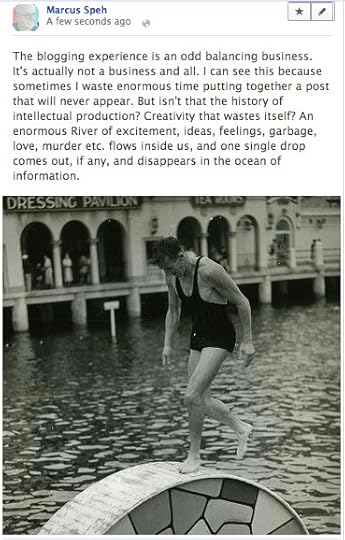 Just in case you feel that you’re missing out because you’re not on Facebook, here’s a little melange for you from the last month of all the stuff that hasn’t been on the blog. Click on any image for a larger view in a new window. Enjoy, like.
Just in case you feel that you’re missing out because you’re not on Facebook, here’s a little melange for you from the last month of all the stuff that hasn’t been on the blog. Click on any image for a larger view in a new window. Enjoy, like. This is from the past. Sheldon has a new book out, too, The Same Terrible Storm (reviewed by Christopher Allen). Oh, and I do still love Ingmar Bergman even though some of his work drives me nuts, it’s so dark. But it always engages my mind.
This is from the past. Sheldon has a new book out, too, The Same Terrible Storm (reviewed by Christopher Allen). Oh, and I do still love Ingmar Bergman even though some of his work drives me nuts, it’s so dark. But it always engages my mind. This is a bit of a whine. My friend Oleuanna called it a “Top Ramble”. A lot of Facebook and Internet writing is stream of consciousness, and my articles are no exception. Still we are a far cry from journalism: I have hardly ever anything to offer but opinion, sometimes well argued, but the poetry of a thought matters to me more than the truth.
This is a bit of a whine. My friend Oleuanna called it a “Top Ramble”. A lot of Facebook and Internet writing is stream of consciousness, and my articles are no exception. Still we are a far cry from journalism: I have hardly ever anything to offer but opinion, sometimes well argued, but the poetry of a thought matters to me more than the truth. This was for PANK’s Christopher Forsley who reads my blog, too. And for the alternative crowd. Beach sloth is one of my favorite sloths in that crowd. I’ve written to/about B.S.
This was for PANK’s Christopher Forsley who reads my blog, too. And for the alternative crowd. Beach sloth is one of my favorite sloths in that crowd. I’ve written to/about B.S. This brought back views that I hold on Conservative politics. As William Blake said: “Expect poison from the standing water.” Radical opinions are a specialty in my family (since 1591 A.D.).
This brought back views that I hold on Conservative politics. As William Blake said: “Expect poison from the standing water.” Radical opinions are a specialty in my family (since 1591 A.D.).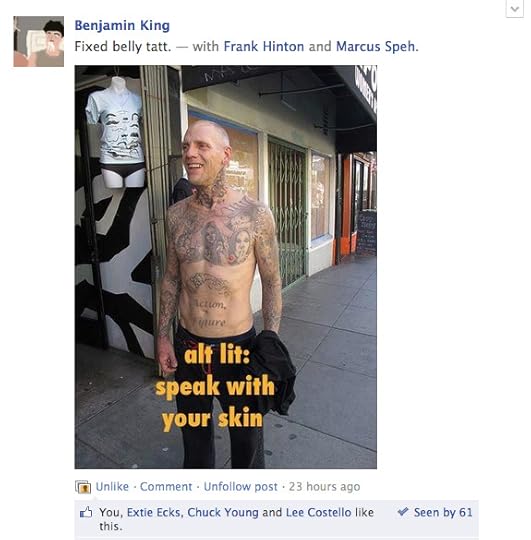 This is a poster I made for Alt Lit Gossip, which was then improved by Benjamin King. Frank Hinton, who founded this group, also has a new book out. It’s called Action, Figure.
This is a poster I made for Alt Lit Gossip, which was then improved by Benjamin King. Frank Hinton, who founded this group, also has a new book out. It’s called Action, Figure. We don’t celebrate enough. They are not enough street fairs and personally I could do with more hugging. Except not early in the morning. I’m like anti-hug in the morning.
We don’t celebrate enough. They are not enough street fairs and personally I could do with more hugging. Except not early in the morning. I’m like anti-hug in the morning. Elephants are favorite elephants of mine, I think if I had enough space at home, I’d live with a pet elephant. I’d have to get a new bed even though my bed is already HUGE.
Elephants are favorite elephants of mine, I think if I had enough space at home, I’d live with a pet elephant. I’d have to get a new bed even though my bed is already HUGE.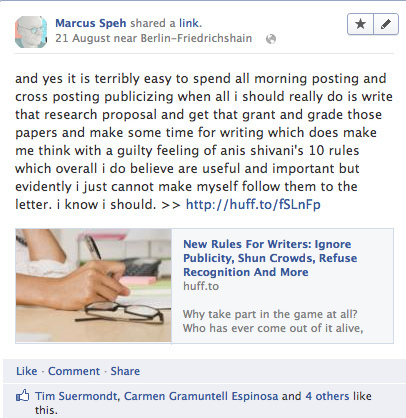 There’s always so much guilt around doing anything on the net. Anis Shivani taps right into that. When I’m really, really tired, I feel as if I’m looking back at myself from the web, waving, trying to get my own attention…
There’s always so much guilt around doing anything on the net. Anis Shivani taps right into that. When I’m really, really tired, I feel as if I’m looking back at myself from the web, waving, trying to get my own attention…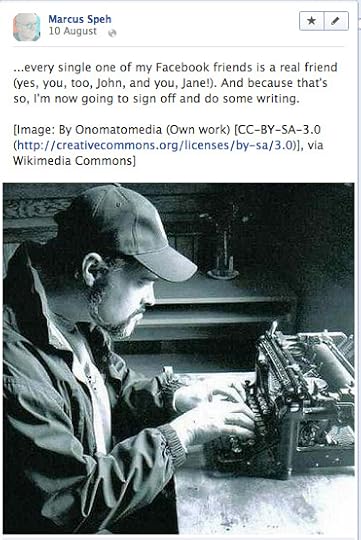 However, sometimes it’s not all idle chat but preparation for writing. I like how focused this guy looks. His beard helps. I’m all for voice dictation now but I still own a bunch of mechanical typewriters: they hang around my house like ghosts.
However, sometimes it’s not all idle chat but preparation for writing. I like how focused this guy looks. His beard helps. I’m all for voice dictation now but I still own a bunch of mechanical typewriters: they hang around my house like ghosts. Yes, Aotearoa, feast your eyes, folks. You’ll never forget the vistas, the scents and the people. I can’t put my finger on it, not from here: it’s too far from Europe (which is a problem if you love Europe as I do).
Yes, Aotearoa, feast your eyes, folks. You’ll never forget the vistas, the scents and the people. I can’t put my finger on it, not from here: it’s too far from Europe (which is a problem if you love Europe as I do). I’m fond of little people perhaps because my daughter is still somewhat little. Or perhaps I’ve got a little person inside me. Notice the flowers wreathed around the bar of the boy’s bike.
I’m fond of little people perhaps because my daughter is still somewhat little. Or perhaps I’ve got a little person inside me. Notice the flowers wreathed around the bar of the boy’s bike.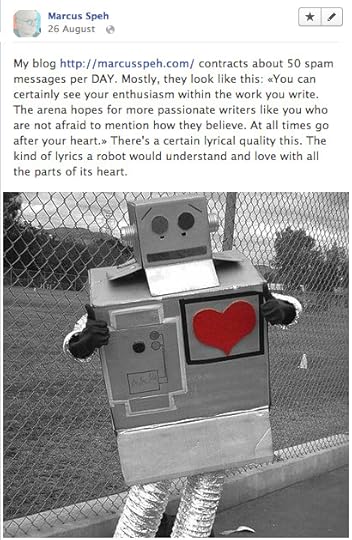 Spam is also an important part of Monty Python. It’s kind of a code word for fans of the comedy genre that they created and that died with the group. I’m feeling nostalgic about Monty Python.
Spam is also an important part of Monty Python. It’s kind of a code word for fans of the comedy genre that they created and that died with the group. I’m feeling nostalgic about Monty Python.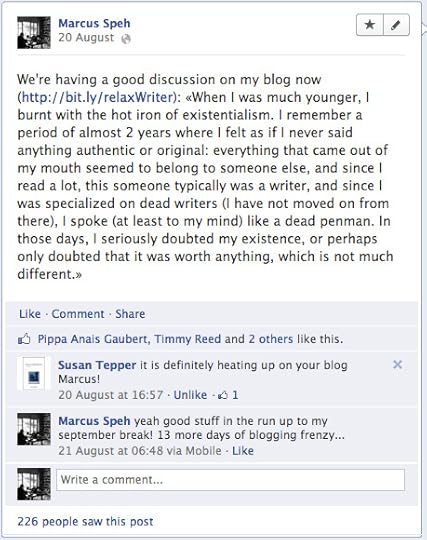 I do talk nonsense sometimes don’t I. I really have no idea what I was going on about here. It made sense at the time, I hope. Relaxing is one of those concepts that are for implementation rather than contemplation.
I do talk nonsense sometimes don’t I. I really have no idea what I was going on about here. It made sense at the time, I hope. Relaxing is one of those concepts that are for implementation rather than contemplation. I’m trying to forget about the fact that I have a book coming out because if I obsess about it I will not write anything you. I am however very grateful to those who said nice things about it. I hope it’s a sign.
I’m trying to forget about the fact that I have a book coming out because if I obsess about it I will not write anything you. I am however very grateful to those who said nice things about it. I hope it’s a sign.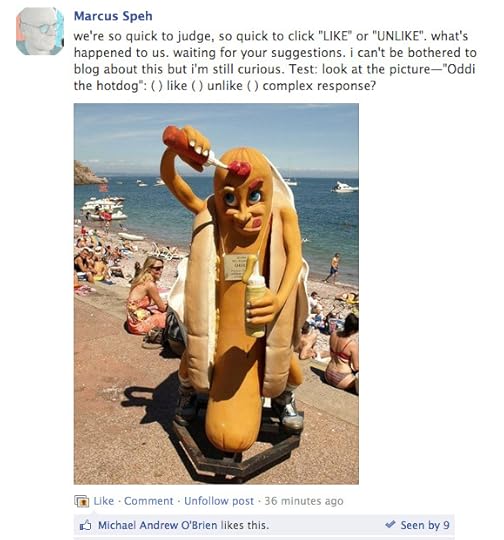 later, I extended the range of options including: ( ) eat ( ) don’t eat ( ) penis ( ) vagina. that photo is hilarious of course: we’ve got one of those giant hotdogs in our neighborhood. Pigeons have built a small castle on its head.
later, I extended the range of options including: ( ) eat ( ) don’t eat ( ) penis ( ) vagina. that photo is hilarious of course: we’ve got one of those giant hotdogs in our neighborhood. Pigeons have built a small castle on its head.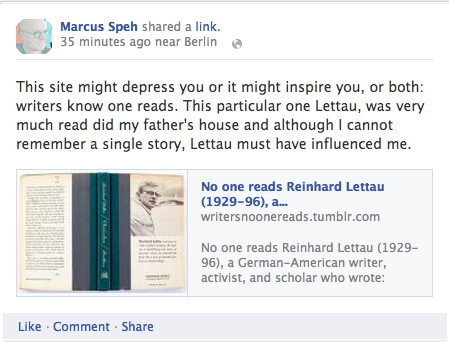 It’s amazing how the past sometimes comes back: rediscovering Reinhard Lettau is a gift from the gods. Turns out he lived around the corner from where I work.
It’s amazing how the past sometimes comes back: rediscovering Reinhard Lettau is a gift from the gods. Turns out he lived around the corner from where I work.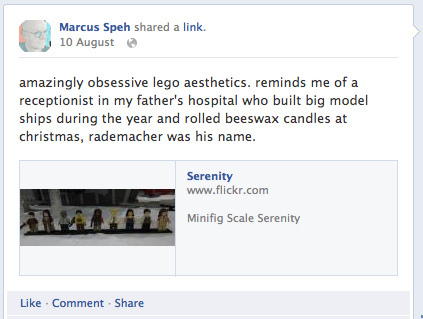 This post, I believe, was about model building. Serenity is a movie (2005) that I like (my wife doesn’t). This last entry begs the question: what happens to all these posts, thoughts, ideas, complaints. But what happens to written notes? There has always been a cloud.
This post, I believe, was about model building. Serenity is a movie (2005) that I like (my wife doesn’t). This last entry begs the question: what happens to all these posts, thoughts, ideas, complaints. But what happens to written notes? There has always been a cloud.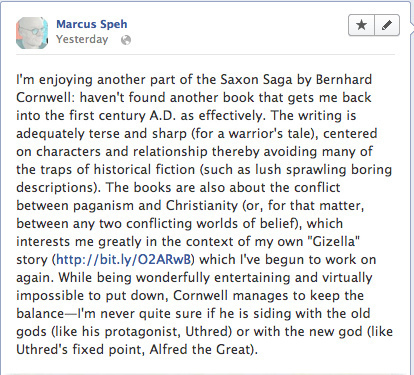
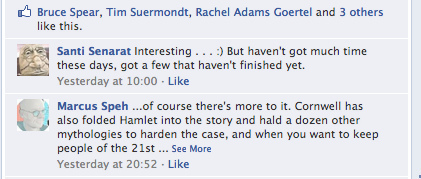 I went through the first 2 books as audio books a year ago like a hot medieval sword through bacon fat…then I tired of it, but it’s interesting to see how Cornwell breaks new ground with established characters and setting. It was also fascinating to me that Uthred is actually a distant ancestor of the author. What if ancestral bonds with their fictitious friends were much more common among writers than hitherto assumed? I’m now starting book for and the fun is not letting up.
I went through the first 2 books as audio books a year ago like a hot medieval sword through bacon fat…then I tired of it, but it’s interesting to see how Cornwell breaks new ground with established characters and setting. It was also fascinating to me that Uthred is actually a distant ancestor of the author. What if ancestral bonds with their fictitious friends were much more common among writers than hitherto assumed? I’m now starting book for and the fun is not letting up.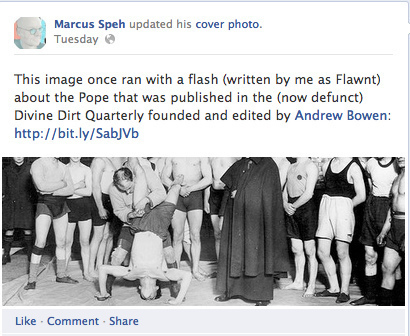 The story mentioned here is a blast from the past: it’s part of my “Christmas cycle”, 24 stories on Christmas Day each in a different time zone of the earth. First published in a Metazen Christmas charity book, the full cycle is part of my debut collection “Thank You For Your Sperm” to come out at the end of this year. I wrote the cycle in the Christmas break 2009. I still remember my excitement about working on one piece for weeks at a time, creating a puzzle of flash pieces, editing them, and having a whole in the end that I couldn’t have planned that way even though I had a rough idea of what I wanted to do.
The story mentioned here is a blast from the past: it’s part of my “Christmas cycle”, 24 stories on Christmas Day each in a different time zone of the earth. First published in a Metazen Christmas charity book, the full cycle is part of my debut collection “Thank You For Your Sperm” to come out at the end of this year. I wrote the cycle in the Christmas break 2009. I still remember my excitement about working on one piece for weeks at a time, creating a puzzle of flash pieces, editing them, and having a whole in the end that I couldn’t have planned that way even though I had a rough idea of what I wanted to do. (At this stage, commenting upon old Facebook posts is getting a bit boring and cumbersome. I’m starting to understand why people thought originally that Facebook is a good idea…) In any case, when I’m not busy distracting myself from real writing, I am currently slowly coming back to last year’s big project: the story of Gisela. My goal is to add substantially to the novel that already exists and edit it to flash awesomeness. My fear is that I might run out of steam. However, I think it’s rather unfounded given that I have come back to my protagonist in this material for well over 3 years. And this Princess is still fascinating to me, her life unprobed and untold even after the 100,000 words that I have already written about her. My suspicion is that I’m writing not just about her but perhaps also about the reflection of our time in her time 1000 years ago. Not a small topic.
(At this stage, commenting upon old Facebook posts is getting a bit boring and cumbersome. I’m starting to understand why people thought originally that Facebook is a good idea…) In any case, when I’m not busy distracting myself from real writing, I am currently slowly coming back to last year’s big project: the story of Gisela. My goal is to add substantially to the novel that already exists and edit it to flash awesomeness. My fear is that I might run out of steam. However, I think it’s rather unfounded given that I have come back to my protagonist in this material for well over 3 years. And this Princess is still fascinating to me, her life unprobed and untold even after the 100,000 words that I have already written about her. My suspicion is that I’m writing not just about her but perhaps also about the reflection of our time in her time 1000 years ago. Not a small topic.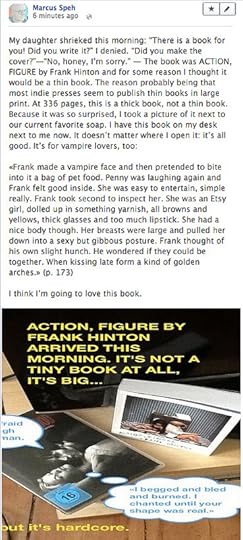 I don’t know if I have been more important to Frank or Frank has been more important to me: Frank has certainly been more generous than I have in telling people (often in reference to his literary online magazine baby, Metazen) that Frank appreciates that I exist. Frank knows, I hope, that this love and appreciation goes the other way, too. It’s very easy to like someone with such long legs, long hair, and exuberant talent, who also does so much for the community of writers everywhere. Frank makes me want to travel to Canada. I’m looking forward to finishing Frank’s book. My daughter really likes the cover, too. I think she might be one of the youngest Hinton fans.
I don’t know if I have been more important to Frank or Frank has been more important to me: Frank has certainly been more generous than I have in telling people (often in reference to his literary online magazine baby, Metazen) that Frank appreciates that I exist. Frank knows, I hope, that this love and appreciation goes the other way, too. It’s very easy to like someone with such long legs, long hair, and exuberant talent, who also does so much for the community of writers everywhere. Frank makes me want to travel to Canada. I’m looking forward to finishing Frank’s book. My daughter really likes the cover, too. I think she might be one of the youngest Hinton fans. There is more than one untold story behind this post. One more I can tell is that I’ve bought a fair amount of old books, not just used books, since a secondhand bookstore opened up on the lowest level of our local mall. The store, which really is nothing but a bunch of stalls, seems unattended at almost all times: it’s hard to buy there, but very easy to browse. Just like in the old days. I love to browse among books that smell like 50 years or more of people reading them. The stalls are surrounded by a thin cloud of old people, some even seem homeless, who also browse alongside “regular” people (including me). These old people will engage the casual passerby in conversation about books. At first, I felt bothered and annoyed and intruded upon, but by now I’ve got used to them and I even look forward to parrying their views. E.T.A. Hoffmann is one of the re-discoveries that came out of this experience.
There is more than one untold story behind this post. One more I can tell is that I’ve bought a fair amount of old books, not just used books, since a secondhand bookstore opened up on the lowest level of our local mall. The store, which really is nothing but a bunch of stalls, seems unattended at almost all times: it’s hard to buy there, but very easy to browse. Just like in the old days. I love to browse among books that smell like 50 years or more of people reading them. The stalls are surrounded by a thin cloud of old people, some even seem homeless, who also browse alongside “regular” people (including me). These old people will engage the casual passerby in conversation about books. At first, I felt bothered and annoyed and intruded upon, but by now I’ve got used to them and I even look forward to parrying their views. E.T.A. Hoffmann is one of the re-discoveries that came out of this experience. Beach Sloth, one of my favorite alt lit bloggers, has honored my list of 10 things to do when being lazy, with a blog post of his own where he puts the criteria to the test. I think he deserves a medal. But he’ll probably be too slothful to fetch it.
Beach Sloth, one of my favorite alt lit bloggers, has honored my list of 10 things to do when being lazy, with a blog post of his own where he puts the criteria to the test. I think he deserves a medal. But he’ll probably be too slothful to fetch it.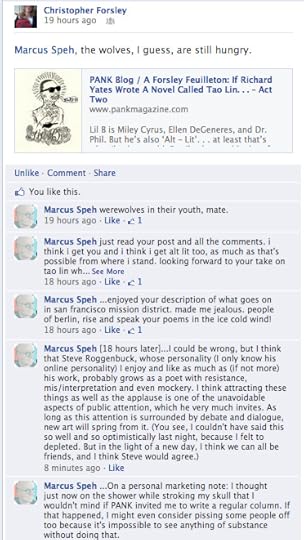 Forsley’s multipart post on the alt lit movement and some of its representatives generates a lot of discussion over at the PANK blog. The author, whatever you might say about this style, surely articulates issues that other people have with alt lit, too, and PANK is alt lit as well, a friendly place to debate. I have happily chimed in: I like both Forsley and alt lit. My access to whatever happens under that label is mostly transmitted via people I like, Steve Roggenbuck and Frank Hinton and Beach Sloth among them. Exciting times!
Forsley’s multipart post on the alt lit movement and some of its representatives generates a lot of discussion over at the PANK blog. The author, whatever you might say about this style, surely articulates issues that other people have with alt lit, too, and PANK is alt lit as well, a friendly place to debate. I have happily chimed in: I like both Forsley and alt lit. My access to whatever happens under that label is mostly transmitted via people I like, Steve Roggenbuck and Frank Hinton and Beach Sloth among them. Exciting times!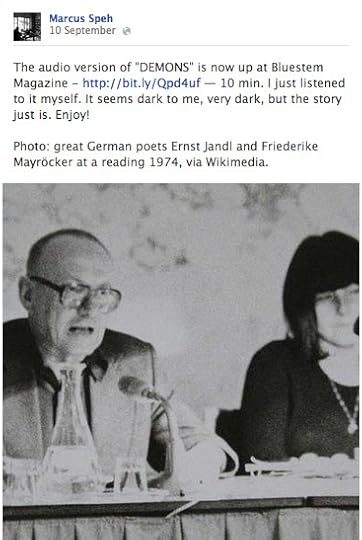 This post was really just a plug for a podcast I made. But I hadn’t read anything for online consumption in a while, and this story in particular was unusual and difficult to read: a brother represents a new line of work for me and one that, I think, I will mine much more. Thanks go to Roxane Gay (also PANK, also Tiny Hardcore Press, also…) for publishing the story in the first place. The 2 poets in the picture are among my favorite poets and performers: the late Ernst Jandl in particular impressed me with his dadaistic readings even when I was still a boy. And today I’m crazy about the long prose poems of his wife, Friederike Mayröcker. Though she really has created her own art form with her work. You must check out.
This post was really just a plug for a podcast I made. But I hadn’t read anything for online consumption in a while, and this story in particular was unusual and difficult to read: a brother represents a new line of work for me and one that, I think, I will mine much more. Thanks go to Roxane Gay (also PANK, also Tiny Hardcore Press, also…) for publishing the story in the first place. The 2 poets in the picture are among my favorite poets and performers: the late Ernst Jandl in particular impressed me with his dadaistic readings even when I was still a boy. And today I’m crazy about the long prose poems of his wife, Friederike Mayröcker. Though she really has created her own art form with her work. You must check out.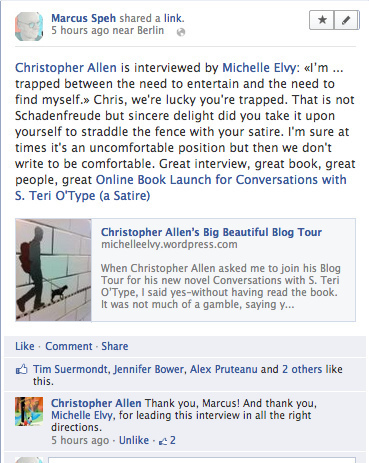 Finally, Christopher Allen. Like me, this veteran (we have the same age and I feel entitled to call us veterans) mixes with a much younger crowd. A seasoned editor (for Metazen and elsewhere) he is recently made his first foray into independent publishing, and he’s everywhere with his blog tour, most likely happening somewhere near you, just open your eyes and let his gay shaman Teri take you by the hand…
Finally, Christopher Allen. Like me, this veteran (we have the same age and I feel entitled to call us veterans) mixes with a much younger crowd. A seasoned editor (for Metazen and elsewhere) he is recently made his first foray into independent publishing, and he’s everywhere with his blog tour, most likely happening somewhere near you, just open your eyes and let his gay shaman Teri take you by the hand…Originally, I only wanted to share a few posts from Facebook over at my blog. But then, as I was entering photos, adding comments, going back and forth between the worlds, this turned into a major undertaking: I may do this again next year but not before. 27 historical posts lined up commented beaten into blog submission featuring SO many people things places…
The answer to the unasked question is of course: you cannot recycle anything online. This is besides the valid point that most online content is recycled already (personally, I like to contribute original content but I can’t always do that); but there is a deeper reason: blogs, Facebook, twitter, they are all living systems, not can collections. Interacting with any part of the system changes the system as a whole. More specifically: as I was setting out to merely rehash old statements, my thinking changed and I felt drawn into changing both my course and my communication, and the posts I wanted to copy had changed, too, because of comments and “likes” and this and that… I wonder if this is not like editing a major piece of writing, or painting a large canvas or a fresco perhaps (the Michelangelo way: fifty people working on one ceiling…). Over to you…

September 8, 2012
frank hinton: «can you explain the importance of the discovery of the higgs boson?»
«The search for the Higgs is physicists’ idea of 21st-century sex. While other sciences limit themselves, the contemporary erotic physics experience involves S&M, mystery, supernatural events, country–size financial budgets, large group events, cafeteria food, brilliant ideas penned on dirty napkins afterwards forgotten, dark matter lords and their antimatter mistresses, and possibly murder, if the hunt for the particle pray should be unsuccessful and if the aesthetically ugly (hence quite possibly wrong) Standard Model should prove to be a collective hoax. A woman named SUSY is often mentioned in this context. Outsiders assume her to be a dominatrix, but the experts know her as a shape shifter. In one moment she is a Roman mama, who makes ingenious lasagna, in the next moment she is Sir Peter Higgs herself, girdled, booted and helmeted, ready to be lowered down into the dangerous caves hollowed out below Switzerland, tunneling through to another universe with just as much trash in it as ours.»
[Frank Hinton's debut novel][A recent at creepy faggot][Photo: By Sen Cross, Hiji and Ryo at Animexx [CC-BY-SA-3.0], via Wikimedia Commons.][First posted at Plattenbau]

September 5, 2012
How to be lazy in 10 steps
[image error]I am now looking forward to 3 weeks of freedom from academic freedom. I feel like a broken record drifting through black outer space, but drifting creatively is all I wish to do.
Let’s increase entropy together, drift with me, people, linger, dawdle, loiter, slack and dally. Niggle the days and nights away. Have nothing to show for and don’t account for anything or anyone. Don’t keep track of the drinks or the dumb things. Collect losers and stroke them with all the tenderness saved up through a lifetime of working the hamster wheel. Rejoice in laxity and be careless with your time as if it’d never run out, which it won’t, seriously, that’s the beauty of it.
To be more specific, here is my current list of top 10 ways to laze. It was a real challenge to articulate these as positive permissions rather than negative interdictions…before you snicker at the low ambition documented here, remember that I’ve been a terrible workaholic all my life:
1. Stay in bed awake for 15 min. before getting up. Keep eyes closed at all costs and keep good images running behind those heavy lids. Tell your arms and legs that they are free to go wherever they want.
[image error]2. Keep calendar free of appointments. Be late for appointments already agreed. Burn old calendars in the basement and scatter ashes in northern wind. Delete all time management apps. Erase the concept of controlled time from your mind.
3. Maintain disorder against the internalized motherly voice. Leave dirty socks in plain sight for days at a time until this seems normal. Lose important data, for example by teleporting files to unknown locations in the cloud and forgetting the passcode.
4. Say no to everything and everyone. When challenged on this, repeat the “no”, and when challenged repeatedly, change to: “fuck no.” If anyone expresses the astonishment at your unwillingness to say “yes”, put them on a blacklist. Send messages to random recipients turning them down. When challenged, deny, thereby further honing your new attitude.
[image error]5. Adopt at least one bad habit per week. Anything that brings the wrath of your neighborhood to your door is probably a bad habit: swearing, smoking, shutting doors in people’s faces, forgetting your medicine, forgetting birthdays, coming to parties without booze or present. The purpose of this exercise is to relinquish false responsibility towards the health of society and the world. Leave that to the politicians: your morality is to create.
6. Eat what and when you like rather than what and when you should. Except other people. Don’t eat other people. If you are used to eating animals, imagine being in animal. If you are vegetarian, stop being so damn righteous and just have a bloody primitive Argentinian steak.
 7. When writing, take the path of least resistance. Make your writing life easy by lighting up like a match: without concern about the finiteness of it all. When covering the page with paragraphs, leave whitespace. When constructing sentences, don’t worry about single words: instead imagine the sentence as a bridge less traveled than any other bridge, a bridge without a purpose and with shabby engineering. A bridge that will break down any moment and you don’t care when that moment comes. And the words: don’t concern yourself with stems and stalks. Work recklessly in a language you don’t understand. Begin the day by babbling incoherently.
7. When writing, take the path of least resistance. Make your writing life easy by lighting up like a match: without concern about the finiteness of it all. When covering the page with paragraphs, leave whitespace. When constructing sentences, don’t worry about single words: instead imagine the sentence as a bridge less traveled than any other bridge, a bridge without a purpose and with shabby engineering. A bridge that will break down any moment and you don’t care when that moment comes. And the words: don’t concern yourself with stems and stalks. Work recklessly in a language you don’t understand. Begin the day by babbling incoherently.
8. Tell yourself that you don’t need to edit. Tell yourself that your writing is already as perfect as it can be. Because you know what? Perhaps it is, and this is your break from performing. Ideally you shouldn’t have to tell yourself a story about “good” and “bad”. We are not in paradise. Nobody is going to be expelled from the jungle of creation.
9. Spend all your time on looking good if you’ve never cared about your looks. You are a compulsive reader? Literary novels? Pick up some superhero comics: go back to that 15-year-old who knew that was all about chicks/boys. You can not come by the secret of how to be lazy by analysis, but only by trial and error and by liberally applied carelessness.
10. Think about that next novel as a manuscript that you find in the Metro. Think about its characters as already out there: no work is involved to get them into your story other than letting them come. Writing is not about work. It’s about growing, eyes on the sun, feet on the ground, soft water playing around your toes like a free song.
Any other advice?

August 31, 2012
elephant men
There was a time when we were all elephant men. Sure, it wasn’t always easy to negotiate two such different halves, but there were noticeable rewards. You never know what a trunk can do until you have one and can control its finest movements. And then there are the large elephant ears, which make wonderful windbreakers and keep you warm like a sweater made of skin. If, on the other hand, you wish to know what’s so great about being grafted to a human body from the point of view of the elephant half, you have to ask the elephants themselves. I do know that they are envious of our small noses and ears, and that there is a large faction among them who would love to play piano. As it is, we’ve developed in different directions. While the elephants had to give up making music on manual instruments, we had to give up mud baths and wrestling with tusks. Some say, that by shedding our elephant side, men have lost masculinity, but prominent feminists have proven again and again that this is not true. Human scientists of different denominations have developed theories and models to show that the elephant man was an evolutionary aberration, the wrong path, taken mindlessly and therefore doomed. In any case, all this, if it happened at all, happened a long time ago. The elephant men have turned into dream people. Instead of evoking awe they’re considered to be freaks, which is too bad. I wish our ability to handle ambivalence and dichotomy were more highly developed.
[First posted at Plattenbau]

true blood
We’ve been watching the TV series “True Blood”. It’s been hard on our rational minds to be honest. Even though I’ve got a soft spot for the whole vampire lore, the script of the soap requires the characters to do extremely unreasonable things all the time. While I recognize that there would be no soap if protagonists and antagonists behaved like normal people rather than cardboard heroes and heroines, it’s annoying and destroys the suspension of disbelief in the story. Even for fantasy this is the core of a good entertainment experience. If you’d be here, you’d hear me huff and puff and mutter along all the time…
I had a dream one of these nights: went to a house there was a party and suddenly my plaster, the plaster covering the small wound on my neck on the left side of my neck comes off. It reveals not a small one but a large scrape with blood oozing from it. But the people in that house don’t have any hydrogen peroxide or alcohol or iodine solution to disinfect the wound. What they do have is a theory that these things are not needed. And because I believe them I’m suddenly insecure: are we (my family) more susceptible to illness and wounds than others?
I wake up, I get up, I go to the bathroom, wash my hands and my face and get back to bed when I lie dozing more than sleeping for hours until the orange light on the alarm clock begins to blink.
I wonder if and how watching soaps on TV affects my writing. I don’t watch any TV apart from an occasional show, but True Blood feels like an addiction. Except it’s not a substance addiction, it’s an addiction to a rather trite but exciting story, a visual page turner. I wonder if watching this stops me from writing. Must take breaks.
One problem with movie characters is that they are very set in their ways, much more so than any character in the novel or story. At the same time, if the movie plot moves along energetically and nicely, movies might teach the writer how to turn characters on the page into acting bodies. I’m also reading Martin Cruz Smith’s novel “Rose”, one of the best books and stories I’ve read lately (or possibly ever). An almost perfect thriller of high literary quality. The characters of this novel, which is equally plot driven, live inside me in a different way from True Blood’s: every time I think of one of the characters from the book and of their actions, I feel inspired either to create another character, or I feel new fire being lit under one of the characters that I already carry in my head. Nothing like that with the TV soap: here, I am just waiting for the next fix. It still gives life energy, but it also absorbs life energy, and the resulting balance feels negative.
What’s the impact of films and TV on your writing?
Image: paper, flowers and plants, iPad, ‘brushes’ app, a balcony, imagination, Flickr.

August 28, 2012
Kreusnach
I picked a slim book up today. It caught my attention because on the pink dust jacket that loudly said “Marcel Proust — Kreusnach”. The title reminded me of the name of my hometown, “Kreuznach” (pronounced “cruise neck“), and as it turns out it actually was just that. The story, written in 1909, describes Proust’s visit to ‘one petite ville d’eaux allemande’, undertaken with his mother in order to treat his asthmatic ailments. Apparently, it was one of the many germs of his magnum opus, “In Search of Lost Time” and found its way into part 3, The Guermantes Way. But rather than simply writing about this stay as a travel experience, Proust’s tale is a long, scarcely punctuated meditation on the quaint beauty and meaning of the arcane aristocratic title of the count of ‘Faffenheim-Münsterburg-Weiningen’, which reminds him of “the names of Homeric heroes”. The name (belonging to an historical German Prime Minister) is sung like the beginning of an incantation. It serves as an excuse to describe the multitude of influences of the Rhineland-Palatine region, which include Goethe, “who christened the hills with his walks”, and “an invisible crown of the holy German Empire situated a little above ground”. Proust leaves the reader somewhat hanging in mid air with a two-headed monster of the Teutonic title and the levitating tiara.  Since this part of In Search of Lost Time also includes an account of the infamous Dreyfus affair, an example of late 19th century anti-Semitism, I cannot be but surprised about the synchronicity that seems to manifest itself once again, as I am deeply engrossed in reading Sebald’s The Emigrants, another, much more modern manner of reflection that also uses the fate of Jews to illuminate the loss of memory, which is a symptom of our time. Is this strange to notice the similarity of the word blankets spread out by both the Germans and the French author writing almost 100 years apart from one another, especially their way of looking at nature and landscape.
Since this part of In Search of Lost Time also includes an account of the infamous Dreyfus affair, an example of late 19th century anti-Semitism, I cannot be but surprised about the synchronicity that seems to manifest itself once again, as I am deeply engrossed in reading Sebald’s The Emigrants, another, much more modern manner of reflection that also uses the fate of Jews to illuminate the loss of memory, which is a symptom of our time. Is this strange to notice the similarity of the word blankets spread out by both the Germans and the French author writing almost 100 years apart from one another, especially their way of looking at nature and landscape.
[Posted at Plattenbau][Photo: Tartin Editionen][goodreads][#reviewforward]


